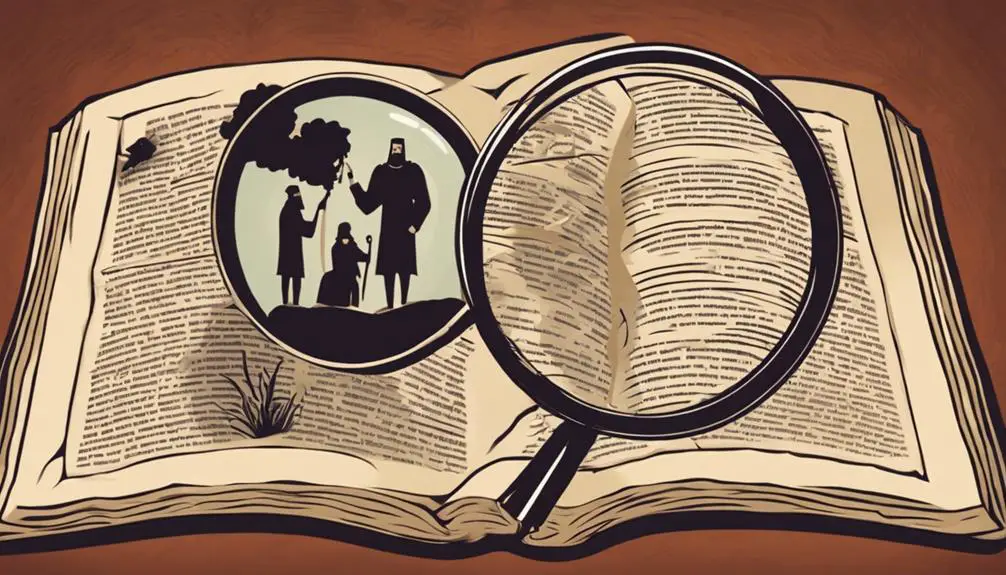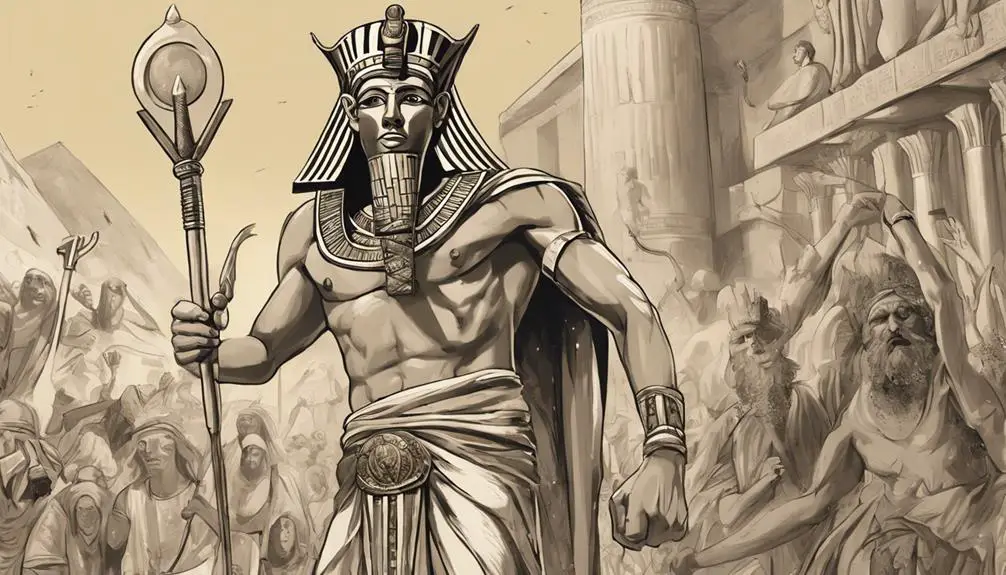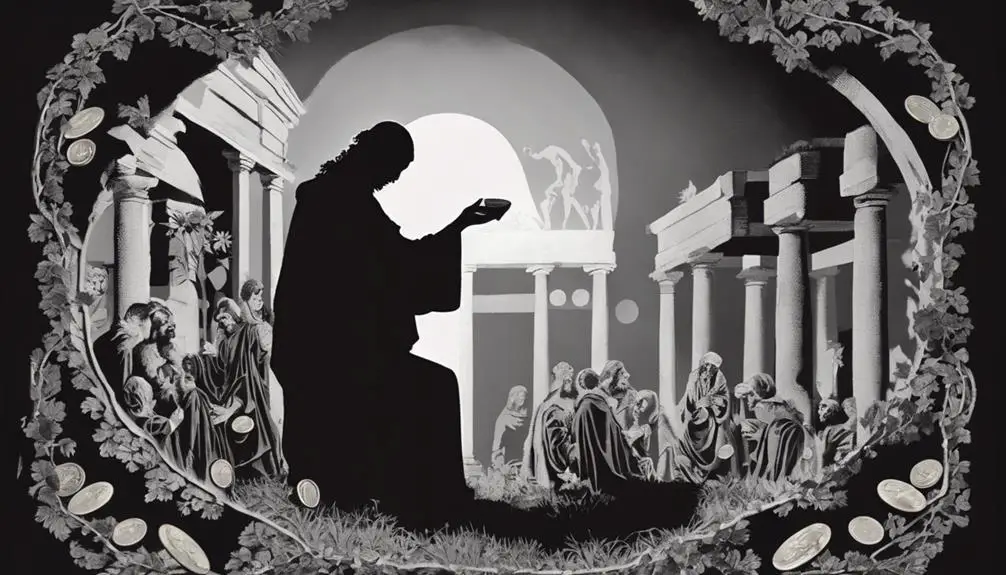Investigate the lessons learned from difficult biblical figures and how their stories can illuminate our own personal growth and self-awareness.

A Study of Difficult People Through the Bible
Consider King Saul, a biblical figure whose jealousy of David's popularity led him down a path of self-destruction. His story, like those of other challenging characters in the Bible, provides us with valuable lessons on human nature and the consequences of our actions.
But what can we learn from these difficult individuals? How can their struggles and failures guide us in our own lives? As we examine these questions, we'll uncover the complex layers of these characters, prompting us to reflect on our own actions and attitudes.
Key Takeaways
- Biblical characters like King David and Judas Iscariot exhibit complex moral struggles that defy simple categorization.
- King Saul's jealousy illustrates the destructive consequences of unchecked emotions and fear-driven decisions.
- Pharaoh's stubbornness serves as a warning against resistance to change and the blindness it can inflict.
- The stories of Jonah and Judas Iscariot emphasize the importance of repentance, personal responsibility, and integrity in one's spiritual journey.
Understanding Biblical Difficult Characters

To fully grasp the complexities of the difficult characters in the Bible, you'll need to delve deep into their stories, peeling back the layers of their actions and choices. These aren't one-dimensional characters; they're complex individuals with intricate narratives, riddled with moral dilemmas, personal struggles, and complicated relationships. Their actions often reflect their humanity—prone to error, capable of great good but also immense harm.
Take King David, for instance. He's often revered as a great king, yet he committed adultery and orchestrated a murder. You can't fully understand David without acknowledging these darker aspects of his character. Similar is the case with Judas Iscariot, who's often vilified for his betrayal of Jesus. While it's easy to label him as evil, delving into his motivations provides a more nuanced perspective.
Understanding these characters in their true light requires a careful reading of the text, combined with an open mind and an analytical approach. It isn't about justifying their actions, but about understanding their motivations, dilemmas, and choices. This deep understanding can provide a richer, more nuanced view of these biblical figures, making their stories all the more compelling.
King Saul's Struggle With Jealousy

Shifting our focus to King Saul, his struggle with jealousy provides a compelling exploration of human frailty and insecurity as seen in biblical narratives. Saul, once chosen by God to lead Israel, allowed jealousy to cloud his judgment, ultimately leading to his downfall.
You see, Saul's jealousy was kindled by the young David, a shepherd boy who gained popularity after defeating Goliath. David's victory sparked a change in the public's perception, with people singing praises of David's tenfold victories over Saul's. This incited a deep-seated jealousy in Saul, who'd once been Israel's hero.
Saul's jealousy didn't just stay dormant; it consumed him, influencing his decisions and actions. He took steps to eliminate David, even throwing a spear at him in a fit of rage. Saul's actions display the destructive power of jealousy, as his irrational fear of losing his throne led him to act against God's chosen one.
Saul's story serves as a stark reminder that unchecked emotions can lead to self-destruction. His jealousy, instead of motivating him to improve, pushed him down a path of paranoia and irrational behavior. Thus, Saul's tale isn't just a biblical story, but a timeless lesson on the perils of jealousy.
The Stubbornness of Pharaoh

Diving into the heart of ancient Egypt, you'll encounter the hard-hearted Pharaoh, a stubborn figure whose refusal to free the Israelites depicts a stark illustration of pride and power gone awry. This Pharaoh, often identified as Ramses II, stands as a symbol of obstinacy, a character flaw that eventually led to his downfall.
The Bible depicts Pharaoh's stubbornness in his repeated denial of Moses' pleas to let the Israelites go. Despite witnessing God's power through plagues, he remained unyielding. His ego wouldn't allow him to relinquish control over his Israelite slaves. Pharaoh's stubbornness wasn't just a personality trait; it was a spiritual issue. He resisted God's will, leading to personal and national disaster.
Pharaoh's story serves as a warning. Stubbornness can blind you to the truth, making you resistant to change and growth. It can hold you back from realizing your mistakes, causing you to repeat them and suffer the consequences. This biblical lesson encourages self-reflection. Are there areas in your life where you're mimicking Pharaoh's stubbornness? Remember, a flexible heart is more likely to find favor with God.
Jonah: Reluctance and Redemption

Venturing into the depths of the biblical narrative, you'll meet Jonah, a figure whose initial reluctance to fulfill God's command signifies our own struggles with obedience and forgiveness. Unlike the stubborn Pharaoh, Jonah isn't inherently evil, but he's deeply flawed, showcasing human frailty and stubbornness.
He's asked to prophesy Nineveh's doom, but instead, he flees. Why? Fear? Prejudice? Jonah's reluctance echoes our own when God's plans conflict with ours. This disobedience leads him into the belly of a whale, a symbol of the dire consequences of ignoring divine instruction.
Yet, Jonah's story is also one of redemption. It's in the whale's belly, in the depths of despair, where he repents and is redeemed. His subsequent obedience leads to Nineveh's redemption, underscoring the power of second chances and God's mercy.
Jonah's journey from reluctance to redemption offers a mirror to our own spiritual struggles. It underscores the cost of disobedience and the transformative power of repentance. It reminds us that, like Jonah, we're given second chances, an opportunity to learn from our mistakes and grow. Jonah's complex character reveals that even the reluctant and flawed can be instruments of divine mercy and redemption.
Lessons From Judas Iscariot

Just as Jonah's story serves as a mirror to our spiritual struggles, the tale of Judas Iscariot presents a stark warning about the dangers of ambition and betrayal.
You see, Judas, one of the twelve disciples, was driven by greed to betray Jesus for thirty pieces of silver. His story serves as a cautionary tale about the pitfalls of unchecked ambition.
Despite being in the Lord's inner circle, Judas allowed his desires to eclipse his faith and loyalty. He teaches us the importance of integrity and the destructive consequences of betrayal. You might think you're immune to such failings, but remember, Judas walked with Jesus himself and still fell prey to his ambitions.
Furthermore, Judas's end is a sobering reminder of the devastating effects of guilt. Unable to bear the weight of his actions, he tragically took his own life. This narrative underscores the significance of seeking forgiveness and making amends, rather than succumbing to guilt.
In analyzing Judas's story, you're reminded to guard your heart against greed and ambition, to uphold integrity even in challenging times, and to seek redemption when you falter. It's a timeless lesson of personal responsibility in our spiritual journey.
Conclusion
Indeed, the Bible is packed with challenging characters like Saul, Pharaoh, Jonah, and Judas. Their stories aren't just ancient history, but relevant lessons.
You see, Saul's jealousy, Pharaoh's stubbornness, Jonah's reluctance, and Judas's betrayal are all tendencies we grapple with. But through understanding these biblical figures, you're reminded of your own potential for growth and the grace available for your transformation.
So, keep studying, keep growing, and remember, even the toughest characters can teach us invaluable lessons.



Sign up